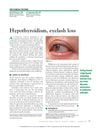 December 2022 in “American journal of medical genetics. Part A”
December 2022 in “American journal of medical genetics. Part A” A person got uncombable hair syndrome from two copies of chromosome 1 from their mother.
 May 2021 in “Journal of the Endocrine Society”
May 2021 in “Journal of the Endocrine Society” A patient produced cortisol after adrenalectomy, possibly due to residual tissue or other body parts making steroids.
May 2021 in “Research journal of topical and cosmetic sciences” TrichovitalsTM improved skin, hair, and nail health in adults after 12 weeks.
 April 2018 in “Journal of Ayurveda and integrative medicine”
April 2018 in “Journal of Ayurveda and integrative medicine” Ayurvedic treatment improved hair growth in a person with hair loss.
 June 1989 in “Diseases of the Colon & Rectum”
June 1989 in “Diseases of the Colon & Rectum” Some patients experience temporary hair loss after ulcerative colitis surgery, likely due to illness rather than the surgery itself, and it usually grows back within six months.
 September 2024 in “Journal of Family Medicine and Primary Care”
September 2024 in “Journal of Family Medicine and Primary Care” Primary health physicians in Saudi Arabia need better guidelines for treating hair loss with vitamins and minerals.
May 2020 in “Archives of Medical Science” Men with androgenetic alopecia have lower levels of certain proteins and more cell damage.
 1 citations,
January 2002 in “Journal of Clinical Dermatology”
1 citations,
January 2002 in “Journal of Clinical Dermatology” Hair loss in androgenic alopecia may be linked to increased local androgen activities, but not to estrogen levels.
 June 2024 in “British Journal of Dermatology”
June 2024 in “British Journal of Dermatology” Misinformation about alopecia is common online and can harm patient choices.
25 citations,
January 1944 in “Experimental Biology and Medicine” Inositol prevents hair loss and improves health in rats.
Dr. SKS Hair Booster Serum is safe and effective for reducing hair fall and promoting hair growth.
 18 citations,
April 2019 in “Archives of Dermatological Research”
18 citations,
April 2019 in “Archives of Dermatological Research” Lactoferrin helps mice grow hair by increasing cell growth and hair follicle development.
 64 citations,
March 2005 in “Journal of Investigative Dermatology”
64 citations,
March 2005 in “Journal of Investigative Dermatology” Brain-Derived Neurotrophic Factor (BDNF) slows down hair growth and promotes hair follicle regression.
 5 citations,
January 2012 in “Hair therapy & transplantation”
5 citations,
January 2012 in “Hair therapy & transplantation” Hair mesotherapy might help with certain types of hair loss but lacks strong scientific proof and has some risks.
1 citations,
May 2022 in “International journal of trichology” Most patients were happy with the hair fiber filler and had no serious side effects.
 58 citations,
January 2007 in “Dermatology”
58 citations,
January 2007 in “Dermatology” Minoxidil use in children may cause heart issues.
 11 citations,
May 2019 in “Journal of Cosmetic Dermatology”
11 citations,
May 2019 in “Journal of Cosmetic Dermatology” Mesotherapy helps treat male hair loss effectively.
 1 citations,
June 2020 in “Actas Dermo-Sifiliográficas”
1 citations,
June 2020 in “Actas Dermo-Sifiliográficas” RF-mesotherapy with dutasteride may be a promising alternative treatment for hair loss.
 1 citations,
February 2023 in “Digestive diseases and sciences”
1 citations,
February 2023 in “Digestive diseases and sciences” Gastroparesis may cause hair loss due to micronutrient deficiencies, and multivitamins might help.
 January 2009 in “Hair transplant forum international”
January 2009 in “Hair transplant forum international” Dr. Rodney Sinclair uses a detailed grading system to diagnose female pattern hair loss, recommends daily spironolactone and minoxidil for treatment, and believes genetics play a role in the condition.
 10 citations,
May 1986 in “Experientia”
10 citations,
May 1986 in “Experientia” Too much zinc in the diet can cause hair loss and color change in young mice by reducing copper in the body.
 February 2025 in “Journal of Dermatological Treatment”
February 2025 in “Journal of Dermatological Treatment” Low-dose oral minoxidil improved hair growth in a woman with short anagen syndrome.
 50 citations,
December 2009 in “Journal of The European Academy of Dermatology and Venereology”
50 citations,
December 2009 in “Journal of The European Academy of Dermatology and Venereology” Latanoprost can effectively treat eyelash hair loss, with 45% of patients showing hair regrowth and no reported side effects.
 April 2024 in “International journal of clinical trials”
April 2024 in “International journal of clinical trials” SesZen-Bio™ improves hair density, thickness, and overall hair health.
 13 citations,
January 2011 in “Lung India”
13 citations,
January 2011 in “Lung India” Stopping isoniazid can reverse hair loss caused by the drug.
 January 2020 in “Mastology”
January 2020 in “Mastology” Flow cytometry was effective in diagnosing metastatic breast cancer in a bone marrow sample.
2 citations,
January 2018 in “Open journal of stomatology” Tongue cancer cells show more plectin-1 than non-cancer cells, but both have similar levels of trichohyalin.
 3 citations,
November 2020 in “Cleveland Clinic Journal of Medicine”
3 citations,
November 2020 in “Cleveland Clinic Journal of Medicine” Eyelash loss can be a sign of thyroid problems.
 January 2024 in “The Journal of Dermatology”
January 2024 in “The Journal of Dermatology” Taking finasteride every other month can still help with hair loss but may be less effective over time compared to taking it daily.
5 citations,
March 2017 in “Molecular biology of the cell” Different parts of cells interact at specific areas to control cell functions like energy production and fat storage.























